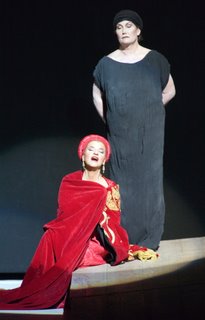Letters from Munich: Elektra
 Photo credit: Wilfrid Hoesl
Photo credit: Wilfrid HoeslJoseph So
The Strauss Week at the Bavarian State Opera continued with Elektra (July 25), in the eleven-year old production by the late director Herbert Wernicke. In the title role was German soprano Gabriele Schnaut. It was rumoured that Frau Schnaut is singing her last Elektra with this performance, moving on to Klytemnestra in the future. If true, Schnaut was certainly going out with a big flourish. In the span of one week, she appeared in Henze's Die Bassariden, sang the taxing Elektra, and in the very next evening, sang non-stop for 35 minutes as Die Fau in Wolfgang Rihm's Das Gehege – now that's lung power!
I first heard Gabriele Schnaut as an amazing Turandot opposite the Calaf of Ben Heppner at the Lyric Opera of Chicago in January 1998. The sheer volume of sound and the steeliness of her tone was impressive – she basically outsang Heppner, who was coming back after several months of vocal ill health. But time has taken its toll on her voice. A few years later when she tackled Brunnhilde at the Met, her vibrato had widened uncomfortably, distorting her otherwise fine performances. As Elektra on Friday, her performance was essentially a triumph of mind over matter. An intelligent artist with total commitment to anything she takes on, Schnaut's Elektra remains remarkable dramatically, even if it suffers from flat high notes and imprecise pitch in the middle, the voice sounding thick and unwieldy. As a result, the text on this evening did not come through with sufficient clarity. But at the end of the one-hour forty-five minute opera, the audience showered her with huge cheers that lasted many minutes. Given that Munich has such a discerning audience, the ovation signified a desire to honour an esteemed artist for what she has been rather than what she is today. If only they were so generous to poor Pamela Armstrong two days earlier...
The abstract Wernicke production is dominated by a huge, hinged, four-sided panel that swivels to allow entrances and exits. The Rothko-like expanse of colour fields is strikingly beautiful. But the downside of this design means severe restrictions in the staging area, although the huge panel served to "push" the voices forward into the auditorium - everyone sounded very loud! Elektra herself is perched on a small, round “island” downstage to the right. Occasionally the hinged panel would tilt sufficiently to reveal a staircase on the left side, presumably leading to the palace. The stage is essentially empty except for the occasional prop, the most important being Elektra's axe which she wields with gusto. In her final "dance", she was swinging it with such abandon that I felt slightly nervous sitting in the 10th row directly in front of her, wondering if she might just accidentally release it into the audience! The most eye-catching costume is a large robe first worn by Klytemnestra, subsequently taken by Elektra, and finally worn by Orest as he enters the palance. Interestingly, this cape-like garment has exactly the same colours and design as the Nationaltheater curtain! At the orchestral climax of the murder of Klytemnestra, Elektra wields the axe with each thundering fortissimo, enough to send a chill into the collective hearts of the audience.
Top vocal honours belonged to Eva-Maria Westbroek (Chrysothemis), whose jugendlich dramatisch soprano, with its huge high C, rang out impressively. She was justly rewarded with a huge ovation. Veteran mezzo Agnes Baltsa may no longer possess the vocal resources of yore, but her Klytemnestra was regal, glamorous, and satisfying. Orest was baritone Gerd Grochowski, a voice new to me. He sang well although without erasing memories of the best interpreters of this role. In modern dress - a suit, no less - he made a handsome and youthful Orest. Perhaps the most surprising singer of the evening was tenor Reiner Goldberg, once an admired Florestan, Siegmund, Erik, and Parsifal. Now a character tenor, his Aegisth was remarkably fresh-voiced and vital, although he was suffering from some sort of tremor in his hands. As expected, the sound coming out of the pit was galvanizing in its impact. I was interested to discover that the conductor was the 34 year old and very talented Johannes Debus. The Canadian Opera Company has just announced that Debus will lead the COC's fall production of War and Peace. I look forward to seeing what he can do with this gigantic Prokofiev's score.
Labels: Elektra, Gabriele Schnaut, Munich Opera Festival



